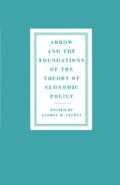Abstract
In many decision situations that individuals face it seems reasonable from either a philosophical or a personal psychological standpoint to concentrate on maximizing subsequent freedom of choice rather than current expected utility. It may be argued against this view that a sufficiently rich decision framework will take account of the utility of such second-order effects as future freedom of decision, properly discounted, of course. But I am deeply sceptical of such all-encompassing utility functions. Most of the time if we maximize in any evident way at all it is in some local and fragmentary fashion. John Stuart Mill’s classic but weak defence of liberty of thought, feeling and public opinion in utilitarian terms is another reason for scepticism about an unrestricted application of the maxim to maximize expected utility. Above all, what empirical studies of individual decision-making we have do not support any grand thesis about maximizing behaviour. The studies too are about local and fragmentary decisions: buying certain goods, betting on horses, buying lottery tickets, choosing a medical treatment, etc.
It is a pleasure to dedicate this chapter to Kenneth Arrow, from whom I have learned a lot. Our friendship goes back more than thirty years. I am indebted to Peter Hammond for several helpful suggestions.
Access this chapter
Tax calculation will be finalised at checkout
Purchases are for personal use only
Preview
Unable to display preview. Download preview PDF.
References
Hayek, F. A. (1960) The Constitution of Liberty(Chicago: University of Chicago Press).
Keneko, M. and Nakamura, K. (1979) ‘The Nash Social Welfare Function’, Econometrica, 47: 423–35.
Krantz, D., Luce, R. D., Suppes, P. and Tversky, A. (1971) Foundations of Measurement, vol. I (New York: Academic Press).
Kreps, D. M. (1979) ‘A Representation Theorem for “Preference for Flexibility”’, Econometrica, 47: 565–77.
Mill, J. S. (1859; 1975) On Liberty(a Norton critical edition, D. Spitz (ed.)) (New York: Norton).
Nash, J. F. (1950) ‘The Bargaining Problem’, Econometrica, 18: 155–62.
Roberts, K. W. S. (1980) ‘Interpersonal Comparability and Social Choice Theory’, Review of Economic Studies, 47: 421–39.
Suppes, P. (1969) Studies in the Methodology and Foundations of Science: Selected Papers from 1951 to 1969(Dordrecht: Reidel).
Suppes, P. (1974) ‘The Measurement of Belief, Journal of the Royal Statistical Society(Series B), 36: 160–75.
Editor information
Editors and Affiliations
Copyright information
© 1987 George R. Feiwel
About this chapter
Cite this chapter
Suppes, P. (1987). Maximizing Freedom of Decision: an Axiomatic Analysis. In: Feiwel, G.R. (eds) Arrow and the Foundations of the Theory of Economic Policy. Palgrave Macmillan, London. https://doi.org/10.1007/978-1-349-07357-3_7
Download citation
DOI: https://doi.org/10.1007/978-1-349-07357-3_7
Publisher Name: Palgrave Macmillan, London
Print ISBN: 978-1-349-07359-7
Online ISBN: 978-1-349-07357-3
eBook Packages: Palgrave Economics & Finance CollectionEconomics and Finance (R0)

